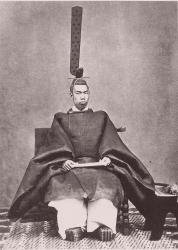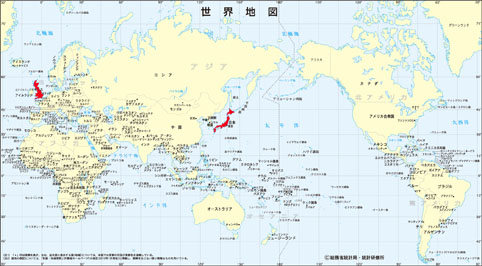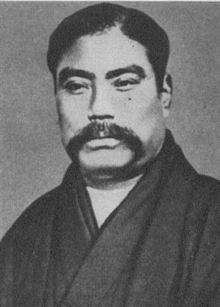Samurais and Emperor of Japan
Emperor Meiji (1852 – 1912), personally called Mutsuhito, of Japan was born and raised in Kyoto.
Before the Meiji Restoration of 1868, the imperial family and court nobles had lived in Kyoto without political power while the samurai shogun in Edo (Tokyo) had governed the whole Japan as the head of the samurai class. Accordingly, the environment where Mutsuhito was living had been full of old fashioned tradition of literature and art without a pragmatic sense of politics and business. Mutsuhito had never experienced outdoor training of martial art like sons of samurai families.
But, when he was a teenager, a revolution occurred in Japan. The Tokugawa clan, whose head had assumed office of the shogun for 250 years, was defeated by the anti-Tokugawa samurai camp through a civil war. The cause of the revolution was that the Tokugawa government could not well cope with the trend of the era when Western powers such as the US, the UK, France and Russia requested Japan to abolish its closed-door policy and opened the country. The shogun decided to open the nation and concluded a diplomatic treaty with the U.S. But, this act was taken as a sign of weakened power of the Tokugawa government by anti-Tokugawa samurais, so that they launched insurgence, taking the imperial court on their side. Accordingly, when the Tokugawa regime fell through the civil war, revolutionary samurais set a new government with the emperor at its center. Therefore, this incident is called the Meiji Restoration (of the imperial authority).
However, Emperor Meiji had not been trained to be the supreme leader in politics and military in the new government. He had been raised mainly by female members of court nobles in Kyoto. So, when the young Emperor moved to Tokyo, the new leaders of the Meiji Government, namely ex-samurais, worried about the state of the mind of Mutsuhito. They decided to introduce a kind of samurai way of living into the imperial court in Tokyo. Female members of court nobles were dismissed around Mutsuhito; instead, ex-samurais were appointed to chamberlains and officials of the Imperial Household Ministry. The atmosphere around Mutsuhito drastically changed from the literature/art-oriented aristocratic circle to the circle influenced by samurai discipline.
As time went by, ex-samurais successfully turned to modern bureaucrats and politicians. They established the modern Imperial Army and Navy. However, the basic spirit of the Meiji Government was strongly and deeply rooted in the samurai spirit. The Meiji Government that was founded by anti-shogun samurais was actually, at its core, another samurai government that took over power from the Tokugawa clan, though it introduced modern systems and customs to modernize and westernize Japan.
Though the Empire of Japan had various democratic systems before WWII, including the universal election system (for males only), its underlying spirit and ideology were extension of those in the samurai era before the Meiji Restoration. This situation was only changed when the Empire was defeated by the US in WWII and the US introduced the American style democracy based on American Christianity into Japan.
And, with the samurai spirit gone, the imperial family abolished its custom and style influenced by samurai-spirited elites since the Meiji Restoration. In other words, Emperor Showa, a grandson of Emperor Meiji, severed his spiritual connection with militarism based on the samurai spirit. It came to symbolize the characteristic of Japan after WWII.
Conversely, ex-samurais or descendants of ex-samurais successfully turned the emperors of that era to a kind of samurai rather than the head of peace-loving court nobles.
That is why Japan cannot be easily understood by the world in terms of its nature before and after WWII. The Japanese people are also embarrassed when they are accused of tragic incidents in East Asia in or before WWII caused by the Imperial military, since they have now almost nothing to do with the samurai spirit that was working on the whole Japan in the era.
So, it is unthinkable that current Emperor or future emperors of Japan become the head of the Japanese military, since the Imperial Family is not a samurai family traditionally.

Emperor Komei, the father of Emperor Meiji

Emperor Meiji

Emperor Taisho

Emperor Showa
**** **** ****
Mat 8:18 Now when Jesus saw great multitudes about him, he gave commandment to depart unto the other side.
Mat 8:19 And a certain scribe came, and said unto him, Master, I will follow thee whithersoever thou goest.
Mat 8:20 And Jesus saith unto him, The foxes have holes, and the birds of the air have nests; but the Son of man hath not where to lay his head.
But, when he was a teenager, a revolution occurred in Japan. The Tokugawa clan, whose head had assumed office of the shogun for 250 years, was defeated by the anti-Tokugawa samurai camp through a civil war. The cause of the revolution was that the Tokugawa government could not well cope with the trend of the era when Western powers such as the US, the UK, France and Russia requested Japan to abolish its closed-door policy and opened the country. The shogun decided to open the nation and concluded a diplomatic treaty with the U.S. But, this act was taken as a sign of weakened power of the Tokugawa government by anti-Tokugawa samurais, so that they launched insurgence, taking the imperial court on their side. Accordingly, when the Tokugawa regime fell through the civil war, revolutionary samurais set a new government with the emperor at its center. Therefore, this incident is called the Meiji Restoration (of the imperial authority).
However, Emperor Meiji had not been trained to be the supreme leader in politics and military in the new government. He had been raised mainly by female members of court nobles in Kyoto. So, when the young Emperor moved to Tokyo, the new leaders of the Meiji Government, namely ex-samurais, worried about the state of the mind of Mutsuhito. They decided to introduce a kind of samurai way of living into the imperial court in Tokyo. Female members of court nobles were dismissed around Mutsuhito; instead, ex-samurais were appointed to chamberlains and officials of the Imperial Household Ministry. The atmosphere around Mutsuhito drastically changed from the literature/art-oriented aristocratic circle to the circle influenced by samurai discipline.
As time went by, ex-samurais successfully turned to modern bureaucrats and politicians. They established the modern Imperial Army and Navy. However, the basic spirit of the Meiji Government was strongly and deeply rooted in the samurai spirit. The Meiji Government that was founded by anti-shogun samurais was actually, at its core, another samurai government that took over power from the Tokugawa clan, though it introduced modern systems and customs to modernize and westernize Japan.
Though the Empire of Japan had various democratic systems before WWII, including the universal election system (for males only), its underlying spirit and ideology were extension of those in the samurai era before the Meiji Restoration. This situation was only changed when the Empire was defeated by the US in WWII and the US introduced the American style democracy based on American Christianity into Japan.
And, with the samurai spirit gone, the imperial family abolished its custom and style influenced by samurai-spirited elites since the Meiji Restoration. In other words, Emperor Showa, a grandson of Emperor Meiji, severed his spiritual connection with militarism based on the samurai spirit. It came to symbolize the characteristic of Japan after WWII.
The emperors of Japan after the Meiji Restoration of 1968 till the End of WWII in 1945 were surrounded and influenced by ex-samurais or descendants of ex-samurais whose basic mind sets were in extension of those of traditional samurais who were primarily warriors.
Conversely, ex-samurais or descendants of ex-samurais successfully turned the emperors of that era to a kind of samurai rather than the head of peace-loving court nobles.
That is why Japan cannot be easily understood by the world in terms of its nature before and after WWII. The Japanese people are also embarrassed when they are accused of tragic incidents in East Asia in or before WWII caused by the Imperial military, since they have now almost nothing to do with the samurai spirit that was working on the whole Japan in the era.
So, it is unthinkable that current Emperor or future emperors of Japan become the head of the Japanese military, since the Imperial Family is not a samurai family traditionally.

Emperor Komei, the father of Emperor Meiji

Emperor Meiji

Emperor Taisho

Emperor Showa
**** **** ****
Mat 8:18 Now when Jesus saw great multitudes about him, he gave commandment to depart unto the other side.
Mat 8:19 And a certain scribe came, and said unto him, Master, I will follow thee whithersoever thou goest.
Mat 8:20 And Jesus saith unto him, The foxes have holes, and the birds of the air have nests; but the Son of man hath not where to lay his head.









